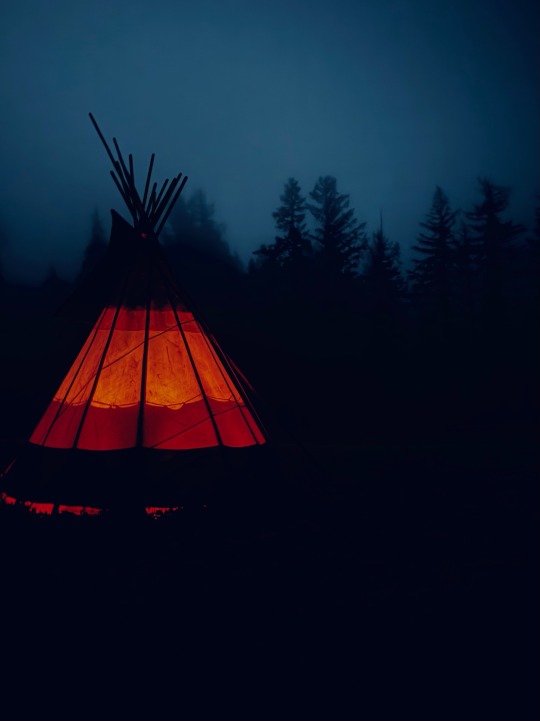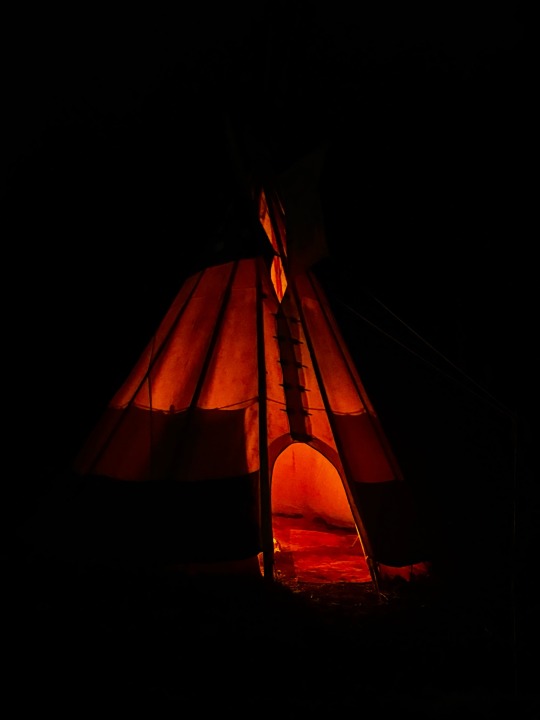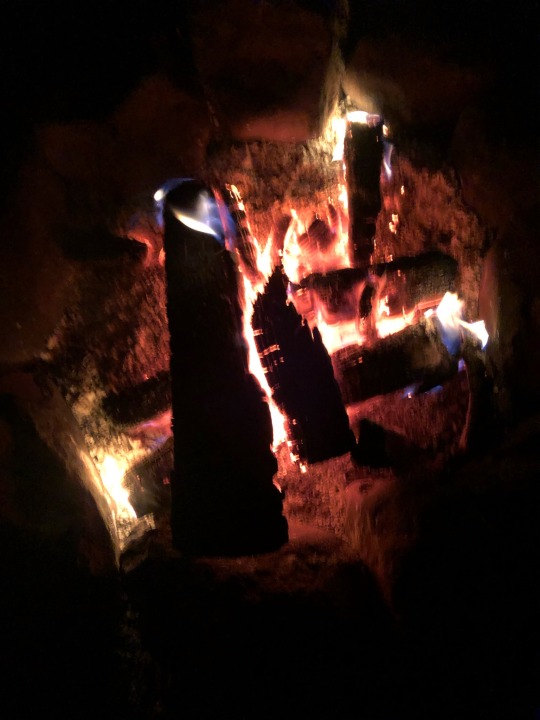#tipi life spiritual prayer connection native
Text




Tipi life….
1 note
·
View note
Text
In Water, I See Standing Rock
The sun isn’t up yet, but gathered around a blazing campfire on this frigid North Dakota morning, a few hundred silhouetted figures stand in prayer. The percussive language of the Lakota people and the smell of burning sage fill the air as the water ceremony affirms the Lakota’s relationship to the earth, to water, to all people. Today in the Oceti Sakowin camp, the mood is sober yet defiant. Yesterday, October 22, Morton County law enforcement had arrested nearly 100 Native American activists and non-native sympathizers who had marched and prayed in a demonstration to block construction of the controversial Dakota Access Pipeline. The sun rises on hundreds more people emerging from tents and tipis, who join those leaving the fire for another day of protest “on the front lines.”
Traveling to Standing Rock revealed God to me in nature, community, and spiritually driven activism. These are the lessons I learned from a beautiful people in a beautiful place:
1. We waste the natural world on resources.
Lakota spirituality insists on our divine relationship to the natural world. Land and water aren't assets; they are life-giving constants. They are home and mother. Thus, indigenous environmentalism isn't first and foremost political. It's rooted in identity and in God.
Walking across the vast, tawny hills of the Plains, I feel the scratchy grass and the wild wind, listen to the river water and humming earth, and I can't help but think that using nature is the worst use of nature.
2. Screw majoritarianism.
Although the Sioux revere elders and have governing bodies, traditionally they don't make decisions through hierarchies, but by consensus. One afternoon, I spent hours helping other volunteers dismantle a kitchen and load a truck with its contents, to re-establish it in the 1851 Treaty Camp, a new site which was in the direct path of the pipeline. As we were about to leave, an elder obstructed us. Emotive and indignant, the diminutive woman scolded us for taking apart the kitchen she had called home for weeks, calling on us simply to pray instead. I muttered my frustration at the delay and couldn't believe one sentimental old lady was going to hold us up. But that's not how the natives around me reacted. Coming to the elder's defense, one woman shouts at the truck driver, "SHE DON'T HAVE TO GO NOWHERE IF SHE DON'T WANT TO." Several youths act as a bridge, consoling the elder and soothing the frustrations of those, like me, whose priorities weren't straight.
And I realize that I am wrong. I see that the Lakota have been forced to move too many times, lost their homes too many times. I see that people must take care of each other when they make decisions. I see the Dakota Access Pipeline (DAPL) in me.
3. Beat the system—as a family.
The camaraderie at Standing Rock is the reason that the US Army Corps denied the DAPL builders permission to drill under the Missouri River. Daily, I saw people share their resources freely, put their bodies on the line for their community, console each other, cheer each other up, and generally do what it took to sustain the cause. Despite the camps’ disorganization, despite their many eccentricities, despite the seeming pointlessness of hippies and Indians camping on the prairie, the love and sacrifice that that assembly showed to each other, to the Lakota people, to everyone who drinks water, and even to their enemies, is triumphing over the capitalist system. Love is stopping the unstoppable, and the whole world is watching.
Lula Red Cloud stands up in a camp meeting, unaided by her walker. Long grey braids fall on either side of her weathered but beautiful face as she declares in a tremulous voice: "They think we're leaving because we'll suffer in the wintertime, but they're wrong. The Lakota people have always suffered, we have endured every attempt to break who we are, but we will always be here."
4. Radical acceptance is more productive than condemnation.
Loren Bagola, of the Cheyenne River reservation, worked security for the camp. An ex-convict, he lacks a right hand and smokes constantly. "I understand some of our young folks are angry, but we need to be centered in peace and in prayer," he says to me one day. "I can't abide division anymore." Fox News quoted him that day: "We are here to pray for our ancestors that were desecrated and pray the pipeline people will find an alternative," he said. "We pray for their workers, too. We pray for police officers and their families. We all have one thing in common: We want clean drinking water."
Overwhelmingly, those gathered at Standing Rock embodied this ethos of radical support, an uncompromising commitment to the well-being of all. The night before the police raided one camp, a tribal elder called everyone in for a camp meeting. Having taken the Rev. Jesse Jackson through a police barricade to the airport, he reported that they had warned him of the raid. He prepared the water protectors for what was to come: "We can't let anyone take this land," the elder said. "We have to stand our ground. Don't disrespect the officers; it won't help us. When they come, lock arms, like a people, like a family, and pray."
I observe the knot in my chest unravel as I realize that I may reject bad outcomes but must radically accept all people.
5. Water is life.
I pull over on the shore of Lake Michigan. The horizon extends far out in front of me, thousands of distant sunstreams pouring into the lake. Fifty feet out, a small rock pillar protrudes from the surface. I wade to it and sit, like a child.
In the past three days I have traveled from the Cannonball River, through the mud of the Dakota badlands, along the shores of Superior, around pristine lakes in Michigan mountains, and now I am here, by the water, again.
In water, I see reconciliation. I see a people healed, empowered, and standing with each other. In water I see connection to the earth. In water, I see God reaching out to a people long forgotten, long abused and saying they have already won. In water I see baptism and new life. In water, I see love put into action. In water, I see Standing Rock.
0 notes